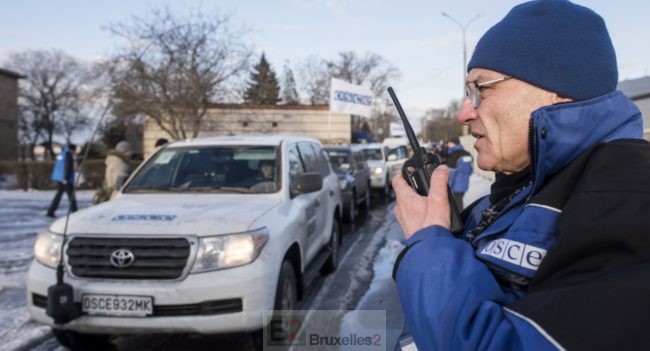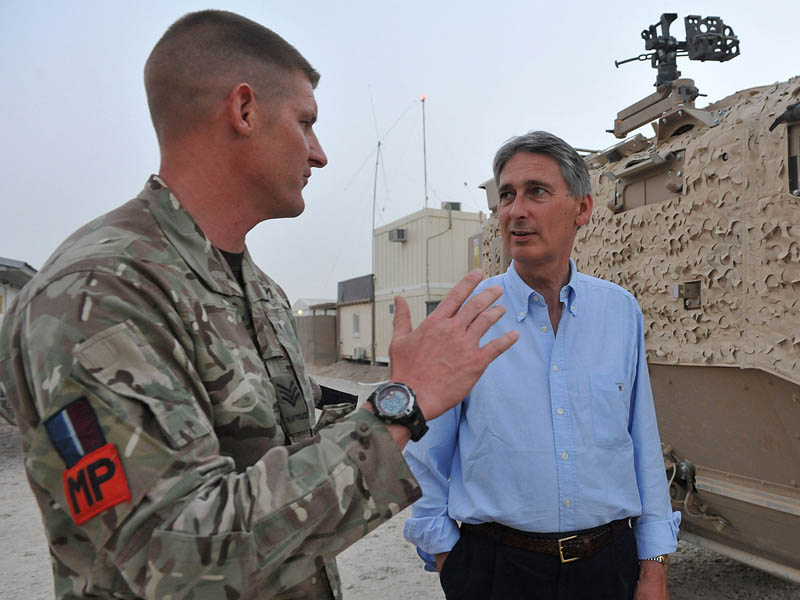A force for peace in eastern Ukraine, ardently desired. Really doable?

(B2) This is a recurring request from the Ukrainian government, and in particular from its president. At each of his trips and meetings, Petro Poroshenko insists on his desire to see a UN peacekeeping mission deployed in the Donbass. This should still be the case when he meets the head of European diplomacy, Federica Mogherini on a visit to kyiv on Monday. The Ukrainian President's press service has indeed announced that " During the meeting, issues relating to security in the Donbass and prospects for the deployment of a UN peacekeeping mission to support the implementation of the Minsk agreements will be discussed ».
The cat and mouse game
In this area, Moscow and kyiv are playing a little cat and mouse. At the start of the crisis, kyiv was not very keen on a peacekeeping force, believing that it could take back lost territories by force. Then changed his mind. In February 2015, Poroshenko announced an initiative to obtain a peacekeeping force asking the European Union to deploy forces on the border. A way according to the analyzes to delay the Minsk process (Read: I want European police on the border with Russia, says Poroshenko. Chick?). At European level, no one has really taken up the challenge. To say that the proposal was received fresh at the ministerial meeting, held in Riga at the time, is quite optimistic (read: Poroshenko's proposal for an EU peace mission in Ukraine: gently shelved).
Putin agrees if the peacekeeping force sanctifies the border
Moscow turned a deaf ear, then, in turn, changed its mind. On September 5, Vladimir Putin played the surprise. Speaking at the BRICS summit in China, he said there would be " nothing bad to deploy peacekeeping forces in Ukraine... On the contrary, it can be beneficial to a resolution of the conflict, as indicated RFI. But he puts one condition: that this force has the sole role of ensuring the safety of OSCE observers. That is to say, deploys on the front line, and not the areas held by the rebels in power in kyiv. Basically, the peacekeeping force thus protected the front line, in a line of demarcation.
Support from Germany and Sweden...
It cannot be said that this initiative has aroused tremendous enthusiasm from both a political and a military point of view, even among the countries that support Ukraine. Admittedly, Germany was quick enough to indicate its support for this idea. The former Minister of Foreign Affairs, Sigmar Gabriel, visiting Kiev at the beginning of January, clearly indicated that a " armed and strong UN peacekeeping mission to achieve a ceasefire across the torn Ukraine would be a " reasonable solution » as reported by the Deutsche Welle.
Words, words
Even though Poroshenko regularly proclaims " receive more and more support from our partners », these supports are still theoretical. The problem with these positions is that they remain declamatory. They occur, usually during a trip to kyiv. Returning to their country, the proclamations often lose their luster a little. Or the countries put such conditions that their commitment is artificial. The Swedish Minister of Defense, Peter Hultqvist, thus split a vibrating support, to listen to certain Ukrainian augurs. But when you look closer. This position is filled with "Si". “If we see the right conditions and if we see that this mission can help ... then we are open to that, [...] We are not there yet, but it is something positive. In particular, he puts one main condition: that Russia and the West agree, indicates the Deutsche Welle. In other words: let's move on...
Rasmussen's lobbying
The former Secretary General of NATO, Anders Fogh Rasmussen, now an international consultant and chief lobbyist for the Ukrainian President (1), does not budge. It commissioned a report in September 2017, written by researcher Richard Lowan, and published in late January (download here) advocating a peacekeeping force in the Donbass, around four ideas:
- This peacekeeping force will need a strong mandate
- It would include 20 people. Non-NATO European countries such as Sweden, Finland or Austria could play an important role.
- A police force and a civilian force of 2000 to 4000 men will also be necessary, the EU being able to play a key role in the constitution of the forces.
- A special representative should be appointed to lead and coordinate the process.
Numbers that make you dizzy
The numbers give the spin. Certainly, they are realistic for the effectiveness of the force. But they are fanciful about political practicality. How could Finland, Sweden and Austria, even with the reinforcement of Latin American countries (as proposed), provide 20.000 men to go to Ukraine? All without the support of any of the NATO countries. How could the EU set up a force of 2000 to 4000 police? That is to say a volume greater than the mission in Kosovo, for a much larger territory, and a little more dangerous. We can dream...
A proposal not really studied by the Europeans
In fact, since 2015, despite appearances and political turmoil, nothing has changed at European level. The issue was not raised within the EU military committee. General Kostarakos noticed this, bitterly, moreover in the face of deputies (read: Has the European Union given up its 'hard power' tools? (Kostarakos)). Moreover, according to our information, no planning option has been set up, nor even directives for any first planning option, have not been given to the crisis management structures by the High Representative. In the ranks of the European Union, there seems to have been no deepening of this question, at any stage whatsoever. A question of realism?
Who wants to go die for Luhansk?
Everyone knows that this deployment depends on Russian... and European will. Moscow has shown in the Syrian conflict that its right of veto in the United Nations Security Council is not theoretical. And even if this veto could be overridden, it would be at the cost of conditions and contortions that could make the deployment of little use. At the practical level, few European states want to send troops there, play punch ball in a mission that could well get bogged down, without having the means to impose peace.
Comment: One may wish for the establishment of a peacekeeping force to silence the guns in Eastern Ukraine. But it wouldn't be peacekeeping in this case, but peace enforcement. Unless Moscow agrees to silence the guns, order its troops to withdraw, its cronies to lay down their arms. It would then have to be given certain important pledges to hope that this force can succeed in this mission. Is it playable today. Not sure...
(Nicolas Gros-Verheyde)
(1) Nb: no one is offended to see the former Secretary General of NATO in the position of lobbyist (where the same ones are crying out loud when it comes to former members of the European Commission ). It is true that during his mandate he had already led an active campaign in favor of Ukraine's accession to the Euro-Atlantic organization, and was always in favor of a "tough" policy towards live in Moscow.
Download the analysis note of the european parliament
